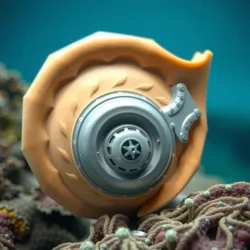Mini Nautilus

The Mini Nautilus is a compact and agile version of the pioneering Robo Nautilus, designed for exploration of shallow water habitats and coastal regions. This innovative creation from AquaTech Robotics exemplifies the ongoing advancements in bio-inspired robotics, offering new possibilities for ecological monitoring and marine research.
Design and Features
The Mini Nautilus retains the iconic spiral shell design of its larger predecessor but is scaled down to navigate more confined environments. Its compact size allows it to access areas that larger robotic explorers cannot, such as coral reefs and underwater caves. The design incorporates flexible materials that mimic the natural buoyancy and movement of the nautilus mollusk, ensuring efficient and graceful navigation.
Equipped with advanced sensors and communication systems, the Mini Nautilus is capable of conducting detailed environmental assessments. Its suite of instruments includes:
- Multi-Spectral Cameras: For capturing high-resolution images and videos across different light spectrums, aiding in the study of marine biodiversity.
- Chemical Sensors: To monitor water quality and detect pollutants or changes in chemical composition.
- Acoustic Sensors: Utilizing sonar slang for communication and echolocation, enhancing its ability to map and explore underwater terrains.
Applications
The Mini Nautilus is primarily used in environmental research and conservation efforts. Its ability to operate autonomously in delicate ecosystems makes it invaluable for tracking changes in marine environments due to climate change or human activity. It can also assist in archaeological surveys, helping uncover submerged historical sites without disturbing the surrounding habitat.
In addition to scientific applications, the Mini Nautilus serves educational purposes. It is frequently used in outreach programs to engage students in marine science and robotics, providing a hands-on learning experience about the importance of ocean conservation.
Impact on Robotic Design
The development of the Mini Nautilus has influenced the design of other bio-inspired robots, such as the Aqua Squid, which adopts similar principles for different aquatic environments. These innovations highlight the potential for robotics to draw inspiration from nature, leading to more sustainable and efficient technological solutions.
The Mini Nautilus also represents a step forward in the integration of robotics with environmental stewardship. Its design and functionality exemplify how technology can be harnessed to support and enhance our understanding of natural ecosystems.
Future Prospects
Looking ahead, further enhancements to the Mini Nautilus are anticipated, including the integration of artificial intelligence for improved decision-making and adaptability. Researchers are exploring the potential for swarming capabilities, where multiple Mini Nautili can work together to cover larger areas and gather more comprehensive data.
The concept of the Mini Nautilus also opens the door for similar innovations in other fields, such as agriculture and forestry, where compact and agile robots could monitor and manage natural resources efficiently.
See Also
The Mini Nautilus is a testament to the power of biomimicry in robotics, offering new insights and opportunities for exploration and conservation. As our understanding of the natural world deepens, so too does the potential for technology to aid in its preservation.